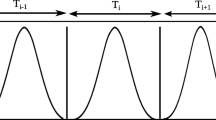Abstract
In recent years, research in speaker verification has expended from using only the acoustic content of speech to trying to utilise high level features of information, such as linguistic content, pronunciation and idiolectal word usage. Phone based models have been shown to be promising for speaker verification, but they require transcribed speech data in the training phase. The present paper describes a segmental Gaussian Mixture Models (GMM) for text-independent speaker verification system based on data-driven Automatic Language Independent Speech Processing (ALISP). This system uses GMMs on a segmental level in order to exploit the different amount of discrimination provided by the ALISP classes. We compared the segmental ALISP-based GMM method with a baseline global GMM system. Results obtained for the NIST 2004 Speaker Recognition Evaluation data showed that the segmental approach outperforms the baseline system. It showed also that not all of the ALISP units are contributing to the discrimination between speakers.
Preview
Unable to display preview. Download preview PDF.
Similar content being viewed by others
References
Parris, E.S., Carey, M.J.: Discriminative phonemes for speaker identification. In: ICLSP, pp. 1843–1846 (1994)
Eatock, J., Mason, J.: A quantitative assessment of the relative speaker discriminant properties of phonemes. In: Proc. ICASSP, vol. 1, pp. 133–136 (1994)
Olsen, J.: A two-stage procedure for phone based speaker verification. In: Bigün, J., Borgefors, G., Chollet, G. (eds.) AVBPA 1997. LNCS, vol. 1206, pp. 199–226. Springer, Heidelberg (1997)
Petrovska-Delacretaz, D., Hennebert, J.: Text-prompted speaker verification experiments with phoneme specific MLP’s. In: Proc. ICASSP, pp. 777–780 (1998)
Mastui, T., Furui, S.: Concatenated phoneme models for text-variable speaker recognition. In: Proc. ICASSP, pp. 133–136 (1994)
Koolwaaij, J., de Veth, J.: The use of broad phonetic class models in speaker recognition. In: Proc. ICSLP (1998)
Kajarekar, S.S., Hermanskey, H.: Speaker verification based on broad phonetic categories. In: 2001: A Speaker Odyssey - The Speaker Recognition Workshop (2001)
Auckenthaler, R., Parris, E.S., Carey, M.J.: Improving a GMM speaker verification system by phonetic weighting. In: Proc. ICASSP (1999)
Hébert, M., Heck, L.P.: Phonetic class-based speaker verification. In: Proc. Eurospeech (2003)
Hansen, E.G., Slyh, R.E., Anderson, T.R.: Speaker recognition using phonemespecific GMMs. In: Proc. Odyssey (2004)
Gutman, D., Bistritz, Y.: Speaker verification using phoneme-adapted gaussian mixture models. In: Proc. EUSIPCO (2002)
Chollet, G., Černocký, J., Constantinescu, A., Deligne, S., Bimbot, F.: Towards ALISP: a proposal for Automatic Language Independent Speech Processing. In: Ponting, K. (ed.) NATO ASI: Computational models of speech pattern processing, Springer, Heidelberg (1999)
Petrovska-Delacrétaz, D., Černocký, J., Hennebert, J., Chollet, G.: Textindependent speaker verification using automatically labeled acoustic segments. In: ICLSP (1998)
Petrovska-Delacrétaz, D., Černocký, J., Chollet, G.: Segmental approaches for automatic speaker verification. DSP, Special Issue on the NIST 1999 evaluations 10(1-3), 198–212 (2000)
Petrovska-Delacretaz, D., El-Hannani, A., Chollet, G.: Searching through a speech memory for text-independent speaker verification. In: Kittler, J., Nixon, M.S. (eds.) AVBPA 2003. LNCS, vol. 2688, Springer, Heidelberg (2003)
Xiang, B., Berger, T.: Efficient text-independent speaker verification with structural gaussian mixture models and neural network. IEEE Transactions on Speech and Audio Processing 11(5) (2003)
Chaudhari, U.V., Navrátil, J., Maes, S.H.: Multi-grained modeling with pattern specific maximum likelihood transformations for text-independent speaker recognition. IEEE Transactions on Speech and Audio Processing 11(1) (2003)
Reynolds, D., Andrews, W., Campbell, J., Navratil, J., Peskin, B., Adami, A., Jin, Q., Klusacek, D., Abramson, J., Mihaescu, R., Godfrey, J., Jones, J., Xiang, B.: The supersid project: Exploiting high-level information for high-accuracy speaker recognition. In: Proc. ICASSP (2003)
Andrews, W., Kohler, M., Campbell, J., Godfrey, J.: Phonetic, idiolectal, and acoustic speaker recognition. In: Speaker Odyssey Workshop (2001)
Reynolds, D., Quatieri, T., Dunn, R.: Speaker verification using adapted gaussian mixture models. DSP, Special Issue on the NIST 1999 evaluations 10(1-3), 19–41 (2000)
Haykin, S.: Neural Networks: A Comprehensive Foundation. IEEE Computer Society Press, Los Alamitos (1994)
Magrin-Chagnolleau, I., Gravier, G., Blouet, R.: Overview of the 2000-2001 elisa consortium research activities. In: Speaker Odyssey Workshop (2001)
Blouet, R., Mokbel, C., Mokbel, H., Sanchez, E., Chollet, G., Greige, H.: Becars: A free software for speaker verification. In: Proc. Odyssey (2004)
Martin, A., Doddington, G., Kamm, T., Ordowski, M., Przybocki, M.: The det curve in assessment of detection task performance. In: Proc. Eurospeech 1997, vol. 4, pp. 1895–1898 (1997)
Author information
Authors and Affiliations
Editor information
Editors and Affiliations
Rights and permissions
Copyright information
© 2005 Springer-Verlag Berlin Heidelberg
About this paper
Cite this paper
El Hannani, A., Petrovska-Delacrétaz, D. (2005). Improving Speaker Verification Using ALISP-Based Specific GMMs. In: Kanade, T., Jain, A., Ratha, N.K. (eds) Audio- and Video-Based Biometric Person Authentication. AVBPA 2005. Lecture Notes in Computer Science, vol 3546. Springer, Berlin, Heidelberg. https://doi.org/10.1007/11527923_60
Download citation
DOI: https://doi.org/10.1007/11527923_60
Publisher Name: Springer, Berlin, Heidelberg
Print ISBN: 978-3-540-27887-0
Online ISBN: 978-3-540-31638-1
eBook Packages: Computer ScienceComputer Science (R0)




